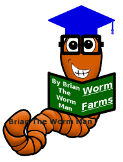Worm Castings For Sale
Worm Castings – Also known as Vermicompost – abbreviated to “VC”
Current pricing and any specials can be found here:
https://thewormman.com.au/local-pickup-price-list-for-worms-vermicompost-and-worm-farms/
For large orders or shipping, please call me for special pricing.
We give full written instructions on the care and use of the VC with each sale. (one is not to keep the lid tight on the bucket to allow some air in)
The pickup address is Collingwood Park – about halfway between Ipswich and Brisbane (in Queensland, Australia for my US friends who may be reading my info)
What ARE Worm Castings?
Basically, worm castings, or VC, is the resulting finished material, from a composting worm farm.
It can be made up of the manure of the worms.
But it also may contain material that has composted within the farm but not strictly passed through a worms gut.
How Is It Processed – Is It Screened And WHY?
I use a rotating trommel harvester, with a combination 4mm & 6mm screen to process the VC that I sell.
This is to remove most of the worms so that I may keep my processing power.
4mm screening does NOT remove worm cocoons.
A screen smaller than 2mm (or USA 1/8 inch) is needed for removing cocoons.
WHY Don’t You Screen To LESS THAN 2mm Then – And KEEP All The Cocoons?
Well -if you are wondering that – it is a VERY good question.
In the beginning I found that screening to even 2mm was VERY labor intensive.
As I have never been short of adult worms, I decided to stick with the 4mm/6mm screen and not go to the extra labor expenses of screening finer.
After all – 4mm/6mm screen removes most lumps, bumps, pumpkin seeds and large pieces of unfinished materials.
What I have learned lately is that 2mm screening (1/8″) may in fact REMOVE a lot of the valuable biology of the VC.
This is due in part to having to DRY the material out quite a lot to make it go through a 2mm screen.
It may also have to do with removing some valuable food materials for worms and other microorganisms to eat in the finished product, shortening it’s shelf life.
So, screening to 4mm/6mm removes most of the imperfect material – but keeps a lot of the soil biology – and THE CUSTOMER gets the cocoons and very small worms for their garden.
(So make sure you MULCH MULCH MULCH to keep conditions right for your plants and microbiology.)
What Inputs Make Up What I Feed To My Farms?
The things that I use to feed into my worm farms are:
“Bedding Materials”
- Well aged/semi composted grass clippings and leaves
- Cardboard is used in some systems – mainly in the bait raising trays
- All material from bait trays is then placed in one of the “CFT” or “Wedge Systems” for further processing. (See point below “How long is it processed for”)
- Newspaper is not used “on purpose” as a bedding. But I don’t like to throw paper away and if it has been used for covering trays or used in the shed, for instance I cannot recycle it into the paper recycling – so I place it in a farm to recycle it.
“Food – Nitrogen Rich Material”:
- Fruit and vegetable waste
- Used coffee grounds
How Long Is It Processed For?
All material sold as castings is in contact with the worms for a minimum of 60 – 120 days, depending on the system.
This is the accepted industry standard, best practice guidelines (Per Vermiculture Technologies by Dr Clive Edwards)
Continuous Flow Through Bins – 60 days minimum
Bin/batch systems (trays) and The Wedge System – 120 days minimum
Please NOTE:
All remaining bedding material from the process of the bait trays is placed in one of the “CFT” or “Wedge Systems” for further processing. This is due in part to my belief that 120 days is a safe and suitable time for material to be in contact with worms. Bait trays are generally processed quicker than this. There are also a lot of worms and cocoons in the bait trays that I wish to harness the processing power of.
You may also like to read other pages and posts within my website about the subject:
How To Use Worm Castings:
https://thewormman.com.au/using-worm-castings/
What Is In Worm Castings That Makes Them Good To Use?
https://thewormman.com.au/worm-compost-information-why-is-it-good/
When Are Worm Castings Ready To Harvest? (BLOG Post)
https://thewormman.com.au/question/when-is-my-worm-farm-ready-to-harvest/

